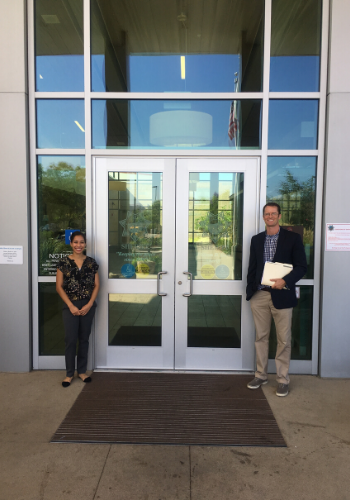School of Communication Launches Institute for Dialogue and Social Justice
The Institute seeks to provide the SDSU and greater San Diego communities with the tools to better facilitate conversations about social justice issues.

Director of the Institute Dr. Luke Winslow and MA grad student Evelyn Puga outside of Las Colinas Women's Detention Center in Santee, before teaching a communication workshop.
by Georgia Burgé
November 12, 2019
November 12, 2019
San Diego State University’s new Institute for Dialogue and Social Justice will encourage the SDSU community to reevaluate the way we communicate about social justice issues.
Housed within the SDSU School of Communication, The Institute was founded to help better equip the SDSU community with the tools and knowledge needed to communicate effectively in our diverse campus community.
The unique location of SDSU brings together people with many different backgrounds and beliefs, which can cause tensions across scholarly (academic/social), political (conservative/liberal), geographic (urban/rural), regional (border issues/US and Mexico), cultural (civilian/military), and material identities (historically privileged/historically oppressed).
According to the director of the Institute, Dr. Luke Winslow, the intersection of these differences creates the perfect context for an institute like this one. “With all of the contextual factors that exist within the San Diego region right now, a lot of academics seek to use their expertise to create social change, and that’s what the Institute of Dialogue and Social Justice aims to do,” Dr. Winslow said. “Our hope is that we can offer a new perspective and contribute to the larger conversation about social justice in our community.”
While the Institute will be housed in the School of Communication, a wide range of disciplines across the SDSU campus are represented in its core faculty, including the Department of Africana Studies, the College of Education, the School of Music and Dance, the School of Theatre, Television, & Film, the School of Public Affairs, the School of Journalism and Media Studies, the L. Robert Payne School of Hospitality & Tourism Management, Women’s Studies, the Women’s Resource Center, the Department of Rhetoric & Writing Studies, the Fowler College of Business, Student Life & Leadership, and members of the wider San Diego community.
Currently, the Institute is focusing on three major initiatives: Criminal & Restorative Justice Community Engagement, Campus Awareness of Social Justice, and Cultural Wealth & Cultivating Cultural Competence.
The first of the three initiatives, Criminal & Restorative Justice Community Engagement, centers on outreach and engagement within San Diego, including offering communication workshops in local detention centers and working with local non-profits that focus on restorative justice. Through these efforts, the Institute hopes to transform incidents of harm into opportunities for healing.
Campus Awareness of Social Justice focuses on SDSU’s campus community. Through this initiative, the Institute will develop a series of interdisciplinary seminars in partnership with SDSU Educational Opportunity Programs and Ethnic Affairs, and Student Life and Leadership that center on critical social justice issues such as Impostor Syndrome, compassion fatigue, equity mindedness, compassionate leadership, and serving diverse communities.
The third initiative, Cultural Wealth & Cultivating Cultural Competence, will focus on creating cultural competence among community members by working with community partners such as the San Diego County Office of Education to benefit traditionally under-represented groups, such as refugees and foster youth. The Institute will challenge inaccurate, offensive, and violent representations of cultural difference.
Through communication criticism and community-engaged research, the Institute will amplify underrepresented voices through research and teaching, and intervene on communication practices that fail to appropriately represent and respect cultural differences.
“We want to make life easier, especially for marginalized people,” said Dr. Winslow. “We strive to use our unique intellectual skills and put them into action in our community to create social change.”
For more information visit the Institue for Dialogue and Social Justice website.
The content within this article has been edited by Lizbeth Persons.
More PSFA Stories